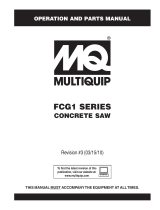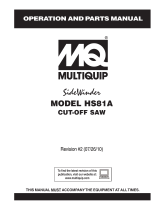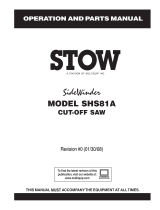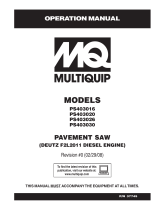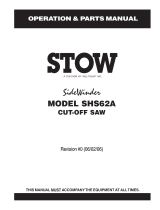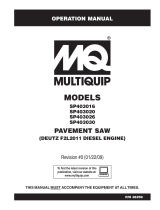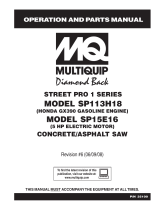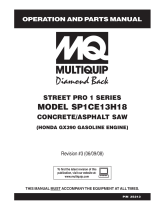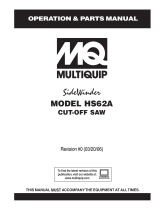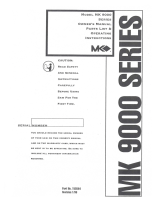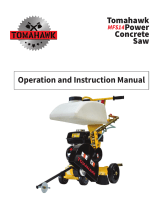Page is loading ...

© COPYRIGHT 2004, MULTIQUIP INC.
OPERATION & PARTS MANUAL
CONCRETE SAW
FCG1 SERIES
Revision #2 (03/10/04)
MODEL #
SERIAL #
P/N 35261
Atlanta • Boise • Newark •
Montreal, Canada • Manchester, UK
Rio De Janiero, BR • Puebla, MX
MULTIQUIP (UK)
HANOVER MILL
FITZROY STREET
ASHTON-UNDER-LYNE
LANCASHIRE, OL7 OTL
UNITED KINGDOM
PH. 0161-339-2223
FAX. 0161-339-3226
E-MAIL: [email protected]
www.multiquip.com
EXPORT VERSION
ORIGINAL INSTRUCTIONS


FCG1 CONCRETE SAW — OPERATION & PARTS MANUAL — REV. #2 (03/10/04) — PAGE 3
HERE'S HOW TO GET HELP
PLEASE HAVE THE MODEL AND SERIAL
NUMBER
ON-HAND
WHEN CALLING
UNITED STATES
MULTIQUIP CORPORATE OFFICE
18910 Wilmington Ave. Tel. (800)-421-1244
Carson, CA 90746 Fax (310)-537-3927
Contact: [email protected]
MEXICO
MQ CIPSA
Carr. Fed. Mexico-Puebla KM 126.5 Tel. (52) 222-225-9900
Momoxpan, Cholula, Puebla 72760 Mexico Fax (52) 222-285-0420
Contact: [email protected]
UNITED KINGDOM
MULTIQUIP (UK) LIMITED HEAD OFFICE
Hanover Mill, Fitzroy Street, Tel. 0161 339 2223
Ashton-under-Lyne, Fax 0161 339 3226
Lancashire OL7 0TL
Contact: [email protected]
CANADA
MULTIQUIP
4110 Industriel Boul. Tel. (450) 625-2244
Laval, Quebec, Canada H7L 6V3 Fax (450) 625-8664
Contact: [email protected]
BRAZIL
MULTIQUIP
Av. Evandro Lins e Silva, 840 - grupo 505 Tel. 011-55-21-3433-9055
Barra de Tijuca - Rio de Janeiro Fax 011-55-21-3433-9055
RJ CEP 22631-470
Contact: cnavarro@multiquip.com.br, srentes@multiquip.com.br
Visit our website at: www.multiquip.com
Your Local Dealer is:

PAGE 4 — FCG1 CONCRETE SAW— OPERATION & PARTS MANUAL — REV. #2 (03/10/04)
FCG1 CONCRETE SAW— TABLE OF CONTENTS
NOTE
Specifications and
part numbers are
subject to change
without notice.
Honda GX200QXC9 Engine
MULTIQUIP— FCG1 CONCRETE
SAW
Here's How To Get Help............................................ 3
Table Of Contents ..................................................... 4
Specifications ............................................................ 5
Dimensions ............................................................... 6
Safety Message Alert Symbols..............................7-8
Rules For Safe Operation ....................................9-11
Operation And Safety Decals.................................. 12
General Information................................................ 13
Components.......................................................14-15
Basic Engine ........................................................... 16
Guards, Covers and V-Belts...............................17-18
Blades ..................................................................... 19
Blade Placement ................................................20-22
Pre-Inspection......................................................... 23
Operation ...........................................................24-27
Maintenance ......................................................28-29
Troubleshooting (Saw) ............................................ 30
Troubleshooting (Engine)...................................31-32
Explanation Of Codes In Remarks Column ............ 34
Suggested Spare Parts........................................... 35
Component Drawings
Decal Locator.....................................................36-37
Guards Assembly...............................................38-39
Guides Assembly ...............................................40-41
Undercarriage Assembly ...................................42-43
Handle & Depth Adjuster Assembly ...................44-45
Engine & Blade Drive Assembly.........................46-47
Air Cleaner Assembly.........................................48-49
Camshaft Assembly ...........................................50-51
Carburetor Assembly .........................................52-53
Control Assembly ...............................................54-55
Crankcase Cover Assembly...............................56-57
Crankshaft Assembly .........................................58-59
Cylinder Barrel Assembly...................................60-61
Cylinder Head Assembly....................................62-63
Fan Cover Assembly..........................................64-65
Flywheel Assembly ...........................................66-67
Fuel Tank Assembly ...........................................68-69
Ignition Assembly ...............................................70-71
Muffler Assembly ...............................................72-73
Piston Assembly.................................................74-75
Recoil Starter Assembly.....................................76-77
Gasket Kit Assembly ............................................... 79
Labels Assembly ................................................80-81
Terms and Conditions of Sale................................. 82

FCG1 CONCRETE SAW — OPERATION & PARTS MANUAL — REV. #2 (03/10/04) — PAGE 5
FCG1 CONCRETE SAW— SPECIFICATIONS
* Nominal Mass: Mass without blade, all fluid tanks empty, any optional parts removed.
** Maximum Operating Mass: Includes blade, all fluid tanks full, any necessary components installed.
*** Hand/Arm Vibration (at handle) results with SFCG1 Saw cutting cured concrete at a depth of 12.7 mm (1/2") with a
254 mm (10") blade at FULL THROTTLE.
)enignE(snoitacificepS.2elbaT
enignE
ledoM9CXQ002XGADNOH12XENIBOR
epyT
elgniS,ekorts4delooc-riA
enignEenilosaG,VHO,rednilyC
elgniS,ekorts4delooc-riA
enignEenilosaG,VHO,rednilyC
ekortSXeroB
mm45xmm86
).ni1.2X.ni7.2(
mm06xmm76
).ni63.2X.ni46.2(
tnemecalpsiD).ni-uc0.21(cc691).ni-uc78.21(cc112
tuptuOxaM
.M.P.R0063/Wk8.4
).P.H4.6(
.M.P.R0004/Wk1.5
).P.H0.7(
yticapaCknaTleuF
sretiL6.3.xorppA
)snollaG.S.U59.0(
sretiL6.3.xorppA
)snollaG.S.U59.0(
leuF
enilosaGelibomotuAdedaelnU
rengihroenatcO68
enilosaGelibomotuAdedaelnU
rengihroenatcO68
yticapaCliOebuL)tqSU36.0(retil06.0)tqSU426.0(retil06.0
lortnoCdeepS
dohteM
epyTthgiew-ylFlagufirtneCepyTthgiew-ylFlagufirtneC
dohteMgnitratStratSlioceRtratSlioceR
noisnemiD
)HxWxL(
mm533X673X313
).ni2.31X8.41x3.21(
mm533X663X113
).ni91.31X4.41x42.21(
yrD
thgieWteN
).sbl3.53(gK61).sbl82.53(gK61
snoitacificepSwaSetercnoC1GCF.1elbaT
)mm(.nieziSrobrA ).nI57.0(mm1.91
)mm(.niyticapaCedalB ).nI01(mm452
))mm(.nihtpeDgnittuC ).nI52.3(mm6.28
)gk(.sbl*ssaMlanimoN ).bL301(gK74
)gk(.sbl**ssaMgnitarepOmumixaM ).bL311(gK15
noitisoPs'rotarepOtaleveLerusserPdnuoSdethgieW-A )A(Bd3.88
leveLrewoPdnuoSdeetnarauG )A(Bd0.011
***)eldnaHtA(noitarbiVmrA/dnaH s/m41.7
2

PAGE 6 — FCG1 CONCRETE SAW— OPERATION & PARTS MANUAL — REV. #2 (03/10/04)
FCG1 CONCRETE SAW— DIMENSIONS
Figure 1. FCG1 Concrete Saw Dimensions
Side View
Front View
snoisnemiDwaSetercnoC1GCF.3elbaT
RETTELECNEREFER NOITPIRCSED )MC(NOISNEMID
A
)desiaRylluFsraBeldnaH(thgieHxaM
).nI57.64(MC7.811
B
)derewoLylluFsraBeldnaH(thgieHxaM
).nI0.23(MC3.18
C
)derewoLretnioPtnorF&desiaRylluFsraBeldnaH(htgneLxaM
).nI86(MC7.271
D
)desiaRretnioPtnorF&desiaRylluFsraBeldnaH(htgneLxaM ).nI84(MC9.121
E
)desiaRretnioPtnorF&derewoLylluFsraBeldnaH(htgneLxaM ).nI93(MC99
F
htdiWllarevOxaM ).nI5.31(MC3.43
G
noitcelfeDraBeldnaHxaM ).nI57.41(MC5.73
)HxWxL(noisnemiDdetarC ).nI32x.nI5.31x.nI5.43(MC4.85xMC3.43xMC6.78

FCG1 CONCRETE SAW — OPERATION & PARTS MANUAL — REV. #2 (03/10/04) — PAGE 7
Safety precautions should be followed at all times when
operating this equipment. Failure to read, understand and
comply with the Safety Messages and Operating Instructions
could result in injury to yourself and others.
FOR YOUR SAFETY AND THE SAFETY OF OTHERS!
This Owner's Manual has been
developed to provide instructions
for the safe and efficient
operation of the FCG1 Concrete
Saw. For engine maintenance
information, please refer to the
engine manufacturer's
instructions for data relative to its
safe operation.
Before using this Concrete Saw, ensure that the operating
individual has read, understands, and complies with all
instructions in this manual.
SAFETY MESSAGE ALERT SYMBOLS
The three (3) Safety Messages shown below will inform you
about potential hazards that could injure you or others. The
Safety Messages specifically address the level of exposure to
the operator, and are preceded by one of three words: DANGER,
WARNING, or CAUTION.
You WILL be
KILLED
or
SERIOUSLY INJURED
if you DO NOT follow these directions.
You CAN be KILLED or
SERIOUSLY INJURED
if
you DO NOT follow these directions.
You CAN be
INJURED
if you DO NOT follow
these directions.
HAZARD SYMBOLS
Engine exhaust gases contain poisonous
carbon monoxide. This gas is colorless and
odorless, and can cause death if inhaled.
NEVER operate this equipment in a confined
area or enclosed structure that does not
provide ample free flow air.
Gasoline is extremely flammable, and its
vapors can cause an explosion if ignited.
DO NOT start the engine near spilled fuel or
combustible fluids. DO NOT fill the fuel tank
while the engine is running or hot. DO NOT
overfill tank, since spilled fuel could ignite if it
comes into contact with hot engine parts or
sparks from the ignition system. Store fuel in
approved containers, in well-ventilated areas
and away from sparks and flames. NEVER
use fuel as a cleaning agent.
Explosive Fuel
Burn Hazards
Engine components can generate extreme heat.
To prevent burns, DO NOT touch these areas
while the engine is running or immediately after
operations. NEVER operate the engine with
heat shields or heat guards removed.
Rotating Parts
NEVER operate equipment with covers, or
guards removed. Keep fingers, hands, hair
and clothing away from all moving parts to
prevent injury.
NOTE
CAUTICAUTI
CAUTICAUTI
CAUTION
DANGERDANGER
DANGERDANGER
DANGER
WARNINGWARNING
WARNINGWARNING
WARNING
Potential hazards associated with FCG1 Concrete Saw operation
will be referenced with Hazard Symbols which appear throughout
this manual, and will be referenced in conjunction with Safety
Message Alert Symbols.
FCG1 CONCRETE SAW— SAFETY MESSAGE ALERT SYMBOLS
Lethal Exhaust Gases

PAGE 8 — FCG1 CONCRETE SAW— OPERATION & PARTS MANUAL — REV. #2 (03/10/04)
FCG1 CONCRETE SAW— SAFETY MESSAGE ALERT SYMBOLS
Accidental Starting
ALWAYS place the ON/OFF switch in the OFF
position, when the saw is not in use.
Over Speed Conditions
NEVER tamper with the factory settings of the
engine governor. Personal injury and damage
to the engine or equipment can result if
operating in speed ranges above maximum
allowable.
Guards and Covers In Place
NEVER operate the saw without blade guards
and covers in place. Adhere to safety guidelines
or other applicable local regulations.
Respiratory Hazard
ALWAYS wear approved respiratory
protection.
ALWAYS wear approved eye and hearing
protection.
Sight and Hearing hazard
Equipment Damage Messages
Other important messages are provided throughout this manual
to help prevent damage to your slab saw, other property, or the
surrounding environment.
This concret/asphalt saw, other property, or
the surrounding environment could be
damaged if you do not follow instructions.
CAUTICAUTI
CAUTICAUTI
CAUTION

FCG1 CONCRETE SAW — OPERATION & PARTS MANUAL — REV. #2 (03/10/04) — PAGE 9
FCG1 CONCRETE SAW— RULES FOR SAFE OPERATION
The following safety guidelines should always be used when
operating the FCG1 Saw.
SAFETY
■
DO NOT operate or service this equipment
before reading this entire manual. The
manual must be kept available and accessible
to the operator.
■
This equipment should not be operated by persons under the
minimum statutory age limit.
■
ALWAYS use extreme caution when working with flammable
liquids. When refueling, STOP the engine and allow it to
cool.
■
NEVER operate the saw in an
explosive atmosphere where fumes
are present, or near combustible
materials. An explosion or fire could
result in severe
bodily harm or even
death.
■
NEVER touch the hot exhaust manifold,
muffler or cylinder. Allow these parts to cool
before servicing the saw.
■
The engine of this saw requires an adequate free flow of
cooling air. NEVER operate the saw in any enclosed or
narrow area where free flow
of the air is restricted. If the
air flow is restricted it will
cause serious damage to the
saw's engine and may cause
injury to people. Remember
the saw's engine gives off
DEADLY
carbon monoxide
gas.
■
High Temperatures – Allow the engine to cool before adding
fuel or performing service and maintenance functions.
Contact with
hot!
components can cause serious burns.
■
ALWAYS refuel in a well-ventilated area, away from sparks
and open flames.
RULES FOR SAFE OPERATION
■
ALWAYS check the saw for loosened hardware such as
nuts and bolts before starting.
■
Replace nameplate, operation and safety decals when they
become difficult to read.
■
NEVER use accessories or attachments which are not
recommended by Multiquip for this equipment. Damage to
the equipment and/or injury to user may result.
■
Manufacturer does not assume responsibility for any accident
due to equipment modifications. Unauthorized equipment
modification will void all warranties. Any modification which
could lead to a change in the original characteristics of the
machine should be made only by the manufacturer who shall
confirm that the machine is in conformity with appropriate
safety regulations.
WARNINGWARNING
WARNINGWARNING
WARNING
Failure to follow instructions in this manual may lead to serious
injury or even death! This equipment is to be operated by
trained and qualified personnel only! This equipment is for
industrial use only.
■
NEVER
smoke
around or near the
machine. Fire or explosion could result
from
fuel vapors
, or if fuel is spilled on a
hot!
engine.
■
Topping-off to filler port is dangerous, as it tends to spill fuel.
■
NEVER use fuel as a cleaning agent.
■
NEVER operate this equipment when not feeling well due to
fatigue, illness or taking medicine.
■
NEVER operate the saw under the influence or drugs or
alcohol.
■
NEVER operate the saw without proper protective clothing,
shatterproof glasses, steel-toed boots and other protective
devices required for the job.
■
NEVER use this machine for any purpose other than those
described in this manual.

PAGE 10 — FCG1 CONCRETE SAW— OPERATION & PARTS MANUAL — REV. #2 (03/10/04)
FCG1 CONCRETE SAW— RULES FOR SAFE OPERATION
General Safety
■
ALWAYS read, understand, and follow procedures in
Operator's Manual before attempting to operate equipment.
■
ALWAYS be sure the operator is familiar with proper safety
precautions and operating techniques before using the saw.
■
NEVER leave the machine
unattended
while running.
■
Apply the brakes when leaving or when using on a slope.
■
Maintain this equipment in a safe operating condition at all
times.
■
ALWAYS stop the engine before servicing, adding fuel and
oil.
■
NEVER run the engine without the air filter. Severe engine
damage could occur.
■
ALWAYS service air cleaner frequently to prevent carburetor
malfunction.
■
AVOID wearing jewelry or loose fitting clothing that may snag
on the controls or moving parts, this can cause a serious
injury.
■
ALWAYS keep clear of
rotating
or
moving parts
while the
saw is in operation.
■
No one other than the operator is to be in the working area
when the saw is in operation.
■
Always observe all applicable compulsory regulations
relevant to environmental protection, especially, fuel storage,
the handling of hazardous substances, and the wearing of
protective clothing and equipment. Instruct the user as
necessary, or, as the user, request this information and
training.
■
ALWAYS store equipment properly when it is not being used.
Equipment should be stored in a clean, dry location out of
the reach of children.
Diamond Blade Safety
■
Use appropriate steel centered diamond blades
manufactured for use on concrete saws. See further blade
information on pages 21 through 23.
■
ALWAYS keep the work area well organized.
■
ALWAYS Clear the cutting area of any debris, tools, etc. that
would constitute a hazard while the saw is in operation.
ALWAYS inspect diamond blades
before each use. The blade should
exhibit no cracks, dings, or flaws in the
steel centered core and/or rim. Center
(arbor) hole must be undamaged and
true. All damaged blades must be
discarded.
ALWAYS check to make sure that the
operating area is clear before starting the
engine.
WARNINGWARNING
WARNINGWARNING
WARNING
■
Examine blade flanges for damage and excessive wear.
■
Ensure the cleanliness of the blade before blade is installed.
Blade should fit snugly on the shaft and against the inside/
outside blade flanges.
■
Ensure the blade is marked with an operating speed greater
than the spindle speed of the saw.
WARNINGWARNING
WARNINGWARNING
WARNING
■
ALWAYS keep blade guards in place. Exposure of the
diamond blade must not exceed 180 degrees.
■
Ensure that the diamond blade does not come into contact
with the ground or surface during transportation. DO NOT
drop the diamond blade on ground or surface.
■
The engine governor is set to regulate maximum engine
speed in a no-load condition. Do not tamper with the engine
governor to increase the speed. Increasing the engine speed
could allow the maximum rated spindle speed to be
exceeded, creating an unsafe condition.
■
Ensure that the blade is mounted for proper operating
direction. (See Figure 12)
■
Adhere to the Blade Manufacturer's recommendations on
handling, storage, and safe usage of blades.
Only cut the material that is specified for the diamond blade.
Read the specifications of the diamond blade to ensure
the proper tool has been matched to the material being cut.
The saw has been engineered for DRY CUTTING. Ensure
a DRY CUTTING blade is being used.
WARNINGWARNING
WARNINGWARNING
WARNING

FCG1 CONCRETE SAW — OPERATION & PARTS MANUAL — REV. #2 (03/10/04) — PAGE 11
FCG1 CONCRETE SAW— RULES FOR SAFE OPERATION
Maintenance Safety
zz
zz
z
NEVER lubricate components or attempt service on a
running machine.
zz
zz
z
ALWAYS allow the machine a proper amount of time to
cool before servicing.
zz
zz
z
Keep the machinery in proper running condition.
zz
zz
z
Fix damage to the machine immediately and ALWAYS
replace broken parts.
zz
zz
z
Dispose of hazardous waste properly. Examples of
potentially hazardous waste are used motor oil, fuel and
fuel filters.
zz
zz
z
DO NOT use food or plastic containers to dispose of
hazardous waste.
Emergencies
zz
zz
z
ALWAYS know the location of
the nearest
fire extinguisher
.
zz
zz
z
ALWAYS know the location of the
nearest
first aid kit
.
zz
zz
z
In emergencies ALWAYS
know the location of the nearest
phone or
keep a phone on the job site
. Also know the
phone numbers of the nearest
ambulance
,
doctor
and
fire department
. Knowing this information is invaluable
in the case of an emergency and could keep a serious
situation from becoming a tragic one.
Saw Transportation Safety
■
DO NOT use the handle bars and/or front pointer as lifting
points.
■
ALWAYS use ramps capable of supporting the weight of the
saw and the operator to load and unload the saw.
■
If the saw must be lifted, use the lifting bale and a crane or
forklift with a rated lifting capacity for the saw. Never attempt
to lift the saw by yourself.
■
When transporting the saw, place the saw directly inside
towing vehicle truck-bed or onto trailer and tie-down securely.
■
NEVER attempt to tow the untrailered saw behind a vehicle.
■
DO NOT use on slopes or on extremely uneven surfaces.
■
NEVER tip the engine to extreme angles as it may cause oil
to gravitate into the cylinder head making the engine start
difficult.
■
NEVER load, unload, or transport the saw with the blade
mounted.
WARNINGWARNING
WARNINGWARNING
WARNING
All displacement of the machine
outside the cutting area shall be
carried out with the tool not in
rotation.

PAGE 12 — FCG1 CONCRETE SAW— OPERATION & PARTS MANUAL — REV. #2 (03/10/04)
FCG1 CONCRETE SAW— OPERATION AND SAFETY DECALS
Figure 2. FCG1 Concrete Saw Decals
Machine Operation And Safety Decals
The FCG1 Concrete Saw is equipped with a number of safety decals (Figure 2). These decals are provided for operator safety and
maintenance information. Should any of these decals become unreadable, replacements can be obtained from your dealer.
P/N 36099 (ISO Blue)
P/N 25427
DECAL SHEET INTL STDS
P/N 11246
LUBRICATION
CHECK
HOT
BELT DRIVE
P/N 15581
P/N 15580
P/N 25491
Always use approved
respiratory protection. Adhere
to safety guidelines. OSHA
Regulations (Standards-
29 CFR) 1926.136 &1910/103
WARNING
Never operate the saw without
the guards in place. Adhere to
safety guidelines: ANSI Code
29 CFR) 1910.215.
WARNING
DEPTH
CONTROL
1
2
3
4
In
(mm)
(102)
(76)
(51)
(25)
R
O
T
A
T
I
O
N
P/N: 13118
P/N 35137
To avoid injury,
you MUST read
and understand
operator’s manual
before using this
machine.
Ask for training
as needed.
This machine to
be operated by
qualified
personnel only.
P/N 35137
WARNING
MODEL
SERIAL NO.
Engine exhaust and some of
its constituents, and some dust created
of California to cause cancer, birth
defects and other reproductive harm.
by power sanding, sawing, grinding,
drillingandother construction activities
contains chemicals known to the State
Some examples of thesechemicals are:
Leadfromlead-based paints.
Crystallinesilicafrom bricks.
Cementandother masonry products.
Arsenicandchromiumfromchemically
treatedlumber.
Your risk from these exposures varies,
dependingonhow often youdo this type
of work. To reduce your exposure to
these chemicals: work in aALWAYS
well ventilated area, and work with
approved safety equipment, such as
dust masks that are specially designed
to filter out microscopic particles.
CONTACT
SERVICE
DEPARTMENT
P/N 20525
P/N 25867
P/N 25485 (large)
P/N 25483
(small)
P/N 25484
(small)
P/N 25482
(large)

FCG1 CONCRETE SAW — OPERATION & PARTS MANUAL — REV. #2 (03/10/04) — PAGE 13
Intended Use
Operate the FCG1 Saw, tools and components in accordance
with the manufacturer's instructions. Use of any other tools for
stated operation is considered contrary to designated use. The
risk of such use lies entirely with the user. The manufacturer
cannot be held liable for damages as a result of misuse.
This saw is not intended for wet cutting. (The use of water sprayed
onto the tool [blade] during the cutting operation).
FAMILIARIZATION
This FCG1 Saw is designed for dry sawing of concrete slabs
utilizing diamond blades. The saw has been engineered for
general and industrial flat sawing applications that include: Joint
Sawing of Green Concrete, Decorative Sawing in Cured
Concrete, Light Demolition Sawing and "V" Groove
Beveling. The simple and compact nature of the SlabSaver
makes it a perfect sawing tool for one person to operate and
transport. The saw combines innovative features, top quality
components, and a committed attention to state-of-the-art
manufacturing.
For peak performance, the SlabSaver has been engineered to
operate a powerful 4.8 Kw (6.5 HP) Honda or 5.1 Kw (7 HP)
Robin Gasoline engine and 254 mm (10") diameter diamond
blades. This special design allows for fast, clean cuts in different
materials at depths from 6.4 mm to 82.6 mm (1/4" to 3 1/4").
For maximum performance and return on investment use:
Diamond Blades.
Retractable front & rear pointers with "tracking wheels" are
provided to support precise straight sawing. This system permits
the operator to quickly adjust the blade cutting depth and
safeguard against "blade-creep" during sawing operations. For
operator comfort and ease of transportation & storage, an
adjustable locking handle bar is provided.
Operator control of the saws is safely accomplished with
adjustable handle bars, and a conveniently oriented raise/lower
lever and depth adjustment wheel. An engine-off switch (Item 22
Fig. 3) located next to the handle lock allows the operator to
safely turn the engine off from the operator's position and away
from moving parts.
The jig-welded reinforced heavy gauge steel frame and chassis
assembly are designed to eliminate operational bending and/or
flex that would lead to diminished blade performance. Also, the
frame's general weight-to-strength ratio and center mounted
blade design ensure accurate tracking in the cut.
A robust blade shaft bearing assembly ensures minimal flutter
and shaft harmonics providing the most advantageous
conditions for a diamond blade at operating speeds.
Heavy-duty front and rear axles, polyurethane wheels with
permanently sealed ball bearings, and solid undercarraige
assembly provide years of reliable use. The SlabSaver
incorporates an innovative PosiLok raise/lower control assembly
that provides fingertip control of blade orientation, infinitely
adjustable locking blade depth control, and depth feed gauge.
FCG1 CONCRETE SAW— GENERAL INFORMATION
ENGINE
Pages 23-27 highlight fundamental aspects of engine inspection,
starting, and shutdown. Refer to the engine Owner's Manual for
specific instructions regarding operation, service and
maintenance.

PAGE 14 — FCG1 CONCRETE SAW— OPERATION & PARTS MANUAL — REV. #2 (03/10/04)
CONTROLS & COMPONENTS
FCG1 CONCRETE SAW—COMPONENTS
Figure 3. FCG1 Concrete Saw
1
2
8
3
7
6
5
4
9
12
22
11
14
18
24
15
20
21
19
13
16
23
10
17

FCG1 CONCRETE SAW — OPERATION & PARTS MANUAL — REV. #2 (03/10/04) — PAGE 15
Figures 3 shows the location of the basic controls or components,
for the FCG1 Concrete Saw. Listed below is a brief explanation
of each control or component
1. Hand Grips/Handlebar – When operating the saw, place
both hands on each grip to maneuver the saw.
2. Adjustable Handle – Set to comfortable operating position.
3. Rear Guide – Rear guide wheel drops into cut to assist in
straight tracking.
4. Air Filter – Prevents dirt and debris from entering the engine
air intake. Keep cleaned and replace when necessary.
5. Recoil Starter Handle – Pull to engage and start the
engine.
6. Recoil Starter Assembly – Engages the engine when
the handle is pulled and rewinds the starter rope when the
handle is released.
7. Wheels/Carraige Assembly – Heavy-duty polyurethane
wheels with permanently sealed ball bearings.
FCG1 CONCRETE SAW—COMPONENTS
8. Diamond Blade – 19.1 mm (0.75" ) Arbor diameter. 254
mm (10") blade capacity. This diameter provides for a depth
of cut from 6.4 mm to 82.6 mm (1/4" to 3 1/4") depth of cut.
9. Blade Guard – Covers saw blade and flips up to allow
blade to be changed.
10. Belt Tension Adjuster – Adjusts belt tension.
11. Front Guide – Assists in straight tracking.
12. Front Guide Arm – Pivots up for storage and pivots down
for use.
13. Depth Adjust Disk – Turn disk clockwise or counter-
clockwise to adjust the cutting depth up or down.
14. Fuel Tank – Use unleaded gasoline. Do not overfill.
15. Shift Knob – Moves Depth Stop Rod in or out of keyhole
slot.
16. V-Belt Cover – Remove this cover to gain access to the V-
belt. NEVER operate the saw with this cover removed.
17. Arbor Shaft Grease Zerks – Conveniently located for
lubrication.
18. On/Off Switch (Engine)– Turn to the "ON" position to
allow engine to be started and turn to the "OFF" position to
prevent accidental starting.
19. Handle Lock – Lock handle height to a comfortable
operating position.
20. Screw Plunger – Line up bottom edge of Depth Stop Rod
on Screw Plunger across from desired depth line mark.
21. Depth Stop Rod – Holds blade above working surface or
allows blade to cut into working surface at specified depth.
22. Engine Shut-off Switch – The Engine Shutdown Switch
located next to the handle lock serves both as an Emergency
Engine Shut-Off and as the primary Shutdown switch. This
allows the operator to shutdown the saw safely away from
moving parts.
23. Dust Collection – Provides for connection to suitable dust
collection bag or vacuum system.
24. Sash – Allows for the lowering and raising of the front
guide from the operator's position.

PAGE 16 — FCG1 CONCRETE SAW— OPERATION & PARTS MANUAL — REV. #2 (03/10/04)
Figure 4. Engine Controls and Components
INITIAL SERVICING
The engine (Figure 4) must be checked for proper lubrication and
filled with fuel prior to operation. Refer to the manufacturers engine
manual for instructions & details of operation and servicing.
1. Fuel Filler Cap – Remove this cap to add unleaded
gasoline to the fuel tank. Make sure cap is tightened
securely. DO NOT over fill.
6. Choke Lever – Used in the starting of a cold engine, or in
cold weather conditions. The choke enriches the fuel
mixture.
7. Air Cleaner – Prevents dirt and other debris from entering
the fuel system. Remove wing-nut on top of air filter
cannister to gain access to filter element.
Operating the engine without an air
filter, with a damaged air filter, or a
filter in need of replacement will
allow dirt to enter the engine, causing
rapid engine wear.
8. Spark Plug – Provides spark to the ignition system. Clean
spark plug once a week.
9. Muffler – Used to reduce noise and emissions.
FCG1 CONCRETE SAW— BASIC ENGINE
Adding fuel to the tank should be done only
when the engine is stopped and has had an
opportunity to cool down. In the event of a fuel
spill, DO NOT attempt to start the engine until
the fuel residue has been completely wiped up,
and the area surrounding the engine is dry.
2. Throttle Lever – Used to adjust engine RPM speed (lever
advanced forward
SLOW
, lever back toward operator
FAST
).
3. Engine ON/OFF Switch – ON position permits engine
starting, OFF position stops engine operations.
4. Recoil Starter (pull rope) – Manual-starting method. Pull
the starter grip until resistance is felt, then pull briskly and
smoothly.
5. Fuel Valve Lever – OPEN to let fuel flow, CLOSE to stop
the flow of fuel.
NOTE
DANGERDANGER
DANGERDANGER
DANGER
WARNINGWARNING
WARNINGWARNING
WARNING
10. Fuel Tank – Holds unleaded gasoline. For additional
information refer to engine owner's manual.
Engine components can generate extreme heat.
To prevent burns, DO NOT touch these areas
while the engine is running or immediately after
operating. NEVER operate the engine with the
muffler removed.

FCG1 CONCRETE SAW — OPERATION & PARTS MANUAL — REV. #2 (03/10/04) — PAGE 17
Figure 7. Pulley Alignment
3. Check V-belt tension by using a tension meter (13.2 Kg -
19.8 Kg / 6.0 - 9.0 lbs.) against the inside belt at a mid point
between the two pulleys, or by deflecting the center belt at a
mid point 10 mm (3/8") to 13 mm (1/2"). See Figure 8.
FCG1 CONCRETE SAW — GUARDS, COVERS AND V-BELTS
NEVER operate the saw without blade
guards and covers in place. DO NOT
operate with the front of the blade guard
raised. The blade exposure cannot exceed
180 degrees during operation. Adhere to
the safety guidelines of the American
National Standards Institute (ANSI)
B7.1 and B7.5.
Figure 5. Blade Guard
CHECK the following on the"blade guard" (Figure 5):
■
Ensure the capacity of the blade guard matches the diameter
of your diamond blade.
■
Check that the guard is bolted firmly upon the saw frame.
■
Check that the spring tensioned front cover of the guard is
firmly seated with the rear section of the guard, and there are
no gaps. NEVER lift the blade guard while cutting.
Figure 6. V-Belt Cover
NEVER attempt to check the V-belt with the
engine running. Severe injury can occur.
Keep fingers, hands, hair and clothing
away from all moving parts.
V-belt Alignment and Tensioning
This concrete saw is equipped with a premium V-belt that has
been aligned and tensioned by factory personnel. The V-belt
must be aligned and tensioned for proper operation of the saw.
Use the following procedure to check the alignment of V-belt:
1. Remove the bolts that secure the V-belt cover (Figure 6) to
the saw frame.
2. Check uniform parallelism (Figure 7) of V-belt and pulley
(sheaves). Use a straight-edge or machinist's square against
both pulleys and adjust both pulleys until equally aligned.
V-belt Check
A worn or damaged V-belt can adversely affect the performance
of the saw. If the V-belt is defective or worn, replace and the V-belt
as outlined on page 18.
CAUTIONCAUTION
CAUTIONCAUTION
CAUTION
WARNINGWARNING
WARNINGWARNING
WARNING

PAGE 18 — FCG1 CONCRETE SAW— OPERATION & PARTS MANUAL — REV. #2 (03/10/04)
FCG1 CONCRETE SAW — GUARDS, COVERS AND V-BELTS
Figure 8. V-Belt Tension Check
4. DO NOT over or under tighten the V-belt. Severe damage
can occur to the saw and engine crank shaft if the belt is
over-tensioned. A decrease of power to the blade and poor
performance will result if the belt is under-tensioned (loose
on pulleys).
If the V-belt become worn or damaged, replace it with P/N 15082
(Gates/Optibelt 3VX335).
3. Tighten the adjusting hex screw (4) while holding the engine
in place to maintain pulley alignment. (a screwdriver can be
used as a lever at the rear belt guard mounting boss to hold
the back of the engine while adjusting V-belt tension.)
4. Re-tighten the locking nut (3).
5. With V-belt held in proper alignment, (engine parallel with
the frame), re-tighten the 4 engine mounting hex screws.
Verify that all hex screws are properly tightened.
To Tighten the V-belt:
NOTE
V-belt alignment must be
rechecked after adjusting belt
tension.
To Remove and Replace the V-belt:
1. Remove the 3 hex screws holding the V-belt guard and
remove the guard.
2. Loosen the 4 engine mounting hex screws. (item 2, Figure 9)
3. Loosen locking nut on the V-belt tension adjuster (item 3,
Figure 9). Loosen the tension on the V-belt by turning the
tension adjuster hex screw (item 4, Figure 9).
4. Pull the engine ahead to provide slack in the V-belt.
5. Loosen the 4 arbor shaft hex screws, (item 1, Figure 9).
Figure 9. V-Belt Tension Adjust
1. With V-belt guard removed, loosen the 4 engine mounting
hex screws. (items 2 Figure 9)
2. Loosen locking nut on the V-belt tension adjuster, (3 ).
6. Remove the two outer arbor shaft hex screws allowing the
outside of the shaft to drop, (B in Figure 10), allowing removal
of the V-belt.
7. Reinstall new V-belt.
8. Re-install and tighten arbor shaft hex head screws.
9. With V-belt held in proper alignment, re-tighten the 4 engine
mounting hex screws. (Follow V-belt tightening procedures.)
10.Re-install belt guard with 3 hex screws.
Figure 10. V-Belt Removal

FCG1 CONCRETE SAW — OPERATION & PARTS MANUAL — REV. #2 (03/10/04) — PAGE 19
Failure to thoroughly inspect the
diamond blade (Figure 11) for
operational safety could result in
damage to the blade, the saw, and may
cause injury to the user or others in the
operating area. All damaged blades
must be discarded.
Figure 11. Diamond Blade
1. Drive Pin Hole – A commonly located hole on the diamond
blade core that prevents operational blade slippage
between the inner & outer blade flanges (collars). Inspect
the diameter of the hole to ensure there is no distortion,
and that a snug fit develops between the hole and drive
pin.
2. Stress Relief Holes (Gullets) –
Check the steel core for
cracks that may have propagated from the slots and/or
gullets. Cracks indicate extreme fatigue failure and if sawing
continues, catastrophic failure will occur.
3. Edge Of The Steel Core – Check the diameter edge for
discoloration (blue oxidation) indicating an overheating
condition caused by insufficient cooling water/air.
Overheating of blades may lead to loss of core tension
and/or increase the possibility for blade failure. Check to
make sure the steel core’s width is uniform about the rim of
the blade, and not succumbing to an “under cutting”
condition brought about by highly abrasive material or
improper under cutting core protection.
4. Directional Arrow – Check to ensure that the blade is
oriented properly on the blade shaft for sawing. Reference
the directional arrow in the blade and place it so the direction
of rotation “downcuts” with the turn of the shaft.
5. Diamond Segment or Rim – Ensure there are no cracks,
dings, or missing portions of the diamond segment/rim. DO
NOT
use a blade that is missing a segment or a portion
of
the rim
. Damaged and/or missing segments/rims may
cause damage to your saw, and injury to the user or others
in the operating area.
6. Specifications – Ensure that the blade specifications, size,
and diameter properly match up to the sawing operation.
Utilizing a diamond blade not matched properly to the task
may result in poor performance and/or blade damage.
7. Arbor Hole – It is essential that the arbor hole diameter
properly matches the blade, and that it is free from
distortions. Correct blade flanges (collars) must be used.
The inside face of the flanges must be clean & free of debris.
An out of round arbor condition will cause damage to the
blade and the saw.
8. MAX RPM – This RPM reference is the maximum safe
operating speed for the blade selected. DO NOT use
blades rated at a lower rotational speed than the rated
RPM of the saw (6000 RPM). Exceeding the MAX RPM is
dangerous, and may cause poor performance and may
damage the blade. All blades must be designed to meet or
exceed the maximum spindle RPM.
SPECIFIC TOOLS TO BE USED
This saw is to use tools (blades) as follows:
Steel Core Segmented or Continuous Diamond Rim
Cutting Wheel.
Any other type of tool is not to be used. See Table 4 for specific
blade usage for material.
WARNINGWARNING
WARNINGWARNING
WARNING
FCG1 CONCRETE SAW — BLADES
Adhere to the Blade Manufacturer's
recommendations on handling,
storage, and safe usage of blades.
NOTE

PAGE 20 — FCG1 CONCRETE SAW— OPERATION & PARTS MANUAL — REV. #2 (03/10/04)
1. Blade Guard - Pivot the blade guard front cover all the way
back. The guard tension spring will keep the front cover in
position.
2. Blade Hex Nut - Unscrew the blade shaft nut (right side
loosens clockwise and tightens counter-clockwise while the
left side loosens counter-clockwise and tightens clockwise.
DO NOT overtighten the nut (approximately 45-50 ft. lb/61-
68 N/m) when finalizing the assembly.
3. Outside Blade Flange (Collar) - Ensure that the outside
blade flange is placed flush against the diamond blade.
The inside surface of the flange must be free of debris and
permit a tight closure on the surface of the blade core.
Cutting Depth
The FCG1 Concrete Saw has a capacity for a 254 mm (10")
blade with an 19.1 mm (0.75") Arbor diameter. This allows a
cutting range from 0 - 82.6 mm (0" to 3 1/4").
FCG1 CONCRETE SAW — BLADE PLACEMENT
Failure to thoroughly inspect the diamond
blade for operational safety could result in
damage to the blades or the saw and may
cause injury to the user or others in the
operating area.
BLADE PLACEMENT
Diamond Blades
Selecting the diamond blade TYPE and GRADE defines how
the blade will perform both in cutting speed and blade life.
Selection of the proper diamond blade consists of:
z
Material to be Cut
z
Type of Saw Being Used
z
Spindle Speed of Saw
z
Hardness Characteristics of the Material
z
Performance Expectations
Factors for sawing economy:
z
Type of Blade
z
Depth of Cut
z
Sawing Speed
z
Characteristics of the Material Being Cut
Blade Speed
A diamond blade’s performance is directly connected to specific
peripheral (rim) speeds.
The following shaft rotational speeds have been factory set to
ensure optimum blade performance.
z
FCG1 - 254 mm (10”)Capacity - 6000 RPM.
Operating saw blades at rotational
speeds greater than those specified by
the manufacturer can cause blade dam-
age, and may injure the user or others in
the operating area.
WARNINGWARNING
WARNINGWARNING
WARNING
D
WARNINGWARNING
WARNINGWARNING
WARNING
Refer to Figure 12 for the following components.
noitceleSedalBdnAgnitsiLlairetaM.4elbaT
lairetaMedalB
etercnoCderuCedalBetercnoCderuC
etercnoCneerGedalBetercnoCneerG
tlahpsAedalBtlahpsA
etercnoCrevotlahpsAedalBetercnoC/tlahpsA
seirotcarfeR,yrnosaM,kcirB,kcolBedalByrnosaM
enotS,cimareC,eliTedalBeliT
/
